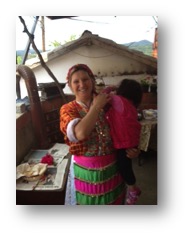Dressing and acting in a manner that shows respect for the host country’s social and cultural values should be the pilgrim’s aim (more on this in the section on respectfully sharing your faith with Muslims. Read that here.).
Some social rules to be aware of in the Middle East are:

Take the Opportunity to Visit With Wonderful Muslim People. This lady made us a wonderful lunch with fresh fruit and vegetables from her garden.
- Never eat, offer or accept anything with your left hand (which among Muslims is reserved for bodily hygiene and is considered unclean).
- Communal eating is an indication of friendship. You don’t just eat to consume – you eat to commune. Take the time to enjoy the experience.
- Western women are not expected to wear head coverings except in the strictest and most observant areas. Wearing head coverings in mosques and other holy sites is expected. You will also find this to be true in some Catholic sites.
- Avoid public displays of affection between people of the opposite sex. Also, women should avoid prolonged eye contact with men. This sends the wrong message, even if you are trying to be friendly.
- Don’t display the sole of your foot or touch anyone with your shoe. You can read about the reasons for this here.
- If you are offered a show of hospitality, whether it is coffee or tea or something more lavish, it is considered discourteous to decline.
- Do not ask for pork or pork products. Muslim and Jewish tradition frowns on consuming pork.
- Men shake hands. Women should wait to see if a man extends his hand before shaking it.
- Standing up for new guests is considered a way of honouring another person, especially if they are an elder.
- The concept of time can mean different things between the Middle East and the West, much like North America and Latin America.
- You will often see men walking hand in hand in Muslim nations. However, generally men and women do not hold hands unless they are married or related.
- Public displays of affection are generally frowned upon.
- During Ramadan, the month when Muslims fast from dawn to sunset, eating or drinking in public in Muslim areas during the fasting hours should be avoided. When visiting holy sites, such as mosques, at any time during the year, maintain a worshipful, quiet spirit and cover up as the site’s hosts might insist. Mosques that allow entrance in Turkey, for instance, will provide plastic slippers for your bare feet and scarves for women to cover their heads.
- While it is difficult to visit the Middle East without being aware of political differences, pilgrims are wise to refrain from expressing opinions about it in public. Feel free to ask questions of the people you meet, but be aware that the answers you get will differ considerably, depending on the person you are talking to.

